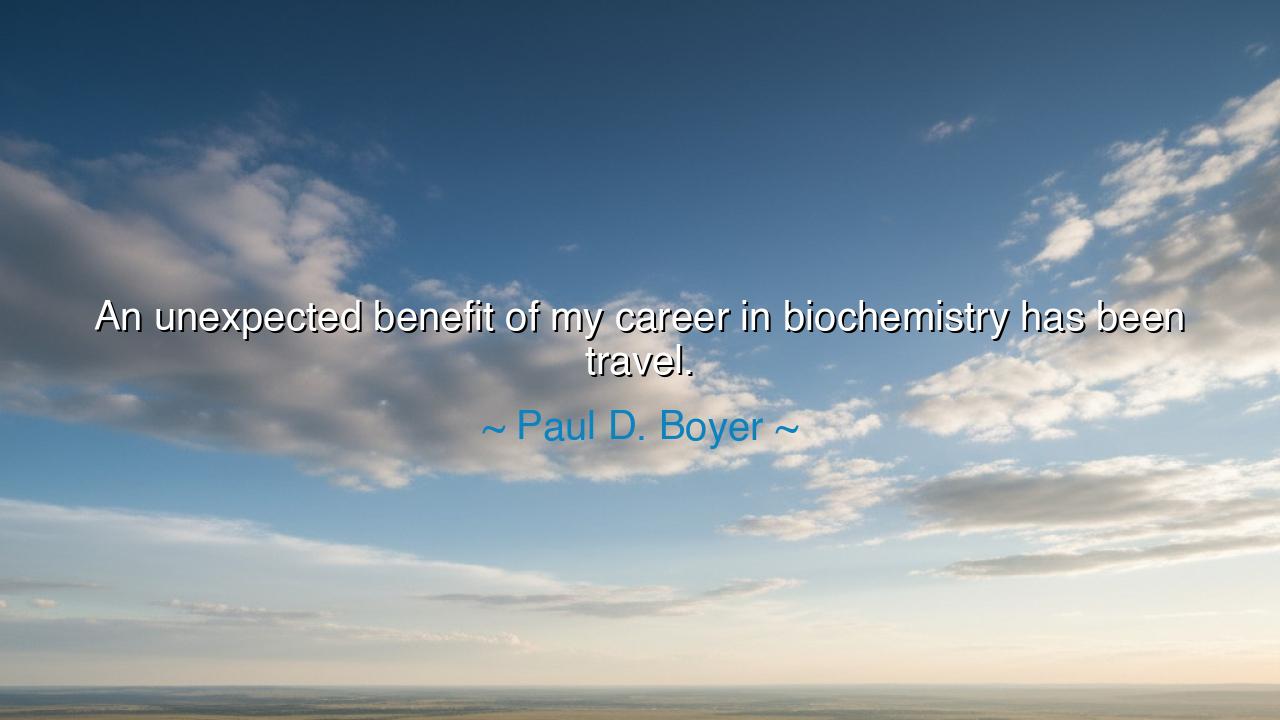
An unexpected benefit of my career in biochemistry has been






Paul D. Boyer, master of biochemistry and seeker of hidden energies within life itself, once reflected with humility: “An unexpected benefit of my career in biochemistry has been travel.” Though the words sound modest, they carry a truth that spans beyond science: that the pursuit of knowledge often opens doors not foreseen, and that the path of learning leads not only inward, to discovery of principles, but outward, into the great world itself.
When Boyer speaks of biochemistry, he recalls a life devoted to studying the invisible engines of creation—the molecules that drive energy, growth, and existence. His reward was not only the satisfaction of knowledge, but journeys across lands and cultures. For science, like art and philosophy, is not confined to one nation. It is a universal language, one that summons minds together from distant shores. Thus, the biochemist found himself also a traveler, his work carrying him far beyond the walls of his laboratory.
The unexpected benefit he names reveals a hidden wisdom: when one pursues a calling with sincerity, blessings arrive that one did not plan. Boyer began not for travel, but for science. Yet the world, in gratitude for his devotion, opened its gates to him. This mirrors the journeys of many before him. The Greek scholars who sought philosophy in Athens found themselves also voyagers, carried across the seas. The monks who copied scriptures in silence were later invited to courts of kings. Often, the pursuit of truth bestows gifts not anticipated.
Consider also the tale of Charles Darwin. He did not embark on the HMS Beagle because he sought adventure, but because he sought understanding of natural history. Yet that voyage, born of study, carried him across oceans, to the Galápagos, to landscapes and life-forms that changed the course of human thought. Travel was the unexpected companion to his science, as it was for Boyer—a reminder that the road of knowledge stretches farther than the mind can predict.
There is also humility in Boyer’s words. He does not boast of travel as conquest or luxury, but as benefit—a gift, not an entitlement. His focus remained on the labor of science, but he acknowledged the joy of stepping into foreign lands, of meeting colleagues, of seeing the world broadened through experience. In this we learn that true fulfillment lies not in chasing travel itself, but in walking faithfully in one’s vocation, allowing the world to unfold its surprises.
The meaning, then, is that knowledge connects the world. The scientist in his laboratory, the poet with her pen, the philosopher with his questions—all may find themselves carried to distant places because truth knows no borders. In seeking to serve humanity through one’s gift, one becomes part of the greater communion of mankind, a fellowship that spans lands and cultures. Travel becomes not escape, but the natural reward of devotion.
Therefore, O seeker of wisdom, learn this: do not begin your life’s work for the sake of its side rewards. Begin it for truth, for love, for passion. But know that along the way, unexpected gifts may be placed in your hands—opportunities to travel, to meet, to see beyond your horizon. Accept them with gratitude, for they are signs that your work reaches further than yourself.
And let Paul D. Boyer’s words endure in memory: “An unexpected benefit of my career in biochemistry has been travel.” For so it is with all who follow their calling—the road of knowledge not only enlightens the mind but also carries the soul into places it never dreamed it would see.






AAdministratorAdministrator
Welcome, honored guests. Please leave a comment, we will respond soon